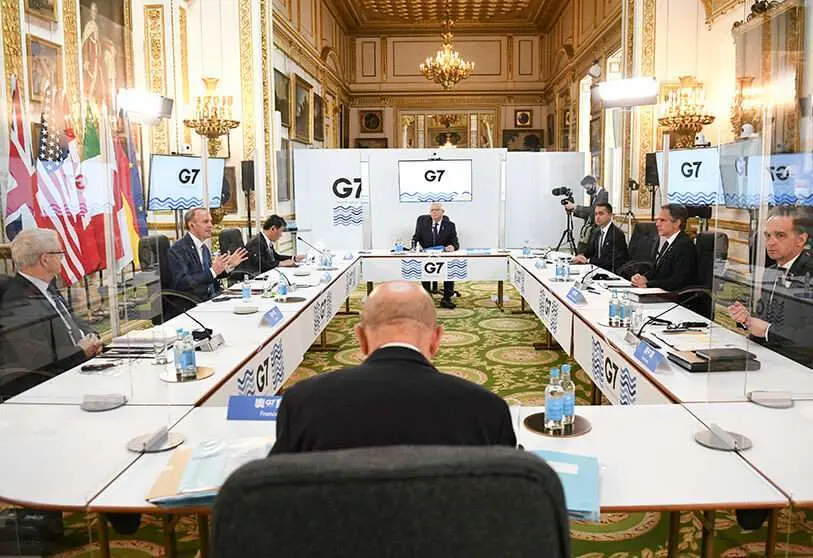Lack of ambition

We do not live in isolation. There are many ignorant people who do not look beyond their own navel and think that what happens in the world does not affect them, and the politicians in the national government and parliament are not free of this, although the problem is more serious at the regional level where villagization is rampant. Much to blame are the various education plans perpetrated in recent decades that turn our children into experts on the rivers of their community in a country where they have little flow, while ignoring the location of the Ganges, the Straits of Malacca, which is the heart of world trade, and some have only recently learned where the Suez Canal is. The Appalachian Mountains and the Atacama Desert are best left unsaid. These are the same people who think that Churruca and Gravina were Franco's admirals, and that is how we are doing because if we despise history and geography we cannot understand what is happening in the world and consequently we will not try to shape it to our convenience. Because there are some countries that invest a lot of effort in making things go a certain way and not another, and Spain should be part of that small group.
The reality is that what happens in the world affects us more and more because we are increasingly interconnected in all aspects, as shown by the current pandemic that originated in China and spread in weeks across the planet, as is now happening with the British, Brazilian or Indian mutations of the virus; or what happened to us in 2008 when northern Europe imposed austerity policies that prevented an early rebound of our battered economy, infected by a banking crisis that began in the US and globalised the collapse of Lehman Brothers. Right now we have spent a few weeks with our souls in suspense until the German courts have lifted their previous freeze on the distribution of European funds to fight the effects of the pandemic, while we wait like the water of May for the borders to be reopened, as Spain is a tourist country dependent on the outside world and very particularly affected by the restrictions on mobility. And if we are talking about mobility, the world's main shipping bottleneck has been blocked for a week by a huge container ship stuck in the Suez Canal, blocking the passage of hundreds of vessels, paralysing industries that did not receive supplies in time. Losses have been estimated at $10 billion a day. The arrival of President Biden in the White House will not put an end to US protectionism, but he has suspended the sanctions on certain Spanish exports (olives, wine, olive oil, etc.) that were penalised as collateral victims of the dispute between Boeing and EADS. These are just a few examples that show that if anyone thinks that what happens in the world does not affect them, they urgently need to take a look at it.
This is why Spain's loss of power and international influence is worrying. Successive governments, from Rodríguez Zapatero until today, have stopped paying attention to the world to focus on a myopic navel-gazing focused on the fight against the economic-financial crisis of 2008, the separatism of part of the Catalans, or the COVID-19 pandemic and the crisis it has brought us, which has triggered the deficit, debt and unemployment. All this is true and these are serious problems, some of which have also been suffered by neighbouring countries that have not for that reason stopped paying attention to what was happening beyond their borders, and to prove it we need only look at Portugal, which until recently presided over the ECB with Mario Centeno and which has placed António Guterres at the head of the UN.
After the UK's Brexit, Spain has risen to fourth place among the 27 European economies, a ranking that is not bad at all. But this, which also imposes responsibilities, has not translated into greater influence in Brussels, where we have only managed to place Josep Borrell as High Representative (with the rank of Vice-President of the European Commission), which, although an important post, is not among the top four. A sign of this lack of interest is the fact that while the government keeps talking about the arrival of the manna of European funds, it says not a word about the decentralised Conference on the Future of Europe, which begins on 9 May to gather ideas for its reform. I have witnessed the surprise that this disinterest, which as I say is not new, is causing among our European partners, who expect a more proactive and participatory attitude from us. As a result, countries such as Poland, Sweden or the Netherlands have more influence than we do at the heart of the European Union.
There is no reason to justify it because both Philip II (who isolated us from the world) and Franco (who was isolated by the world) are long gone. Just as the years of Felipe González and José María Aznar, in which, with antagonistic styles, we managed to fight in the world with great ambition and punch above our weight, are also far behind us. There is no reason not to try again.... All we need are less flat policies, a little ambition and clear ideas to try to shape the future to our convenience, as others do.
Jorge Dezcallar Ambassador of Spain

